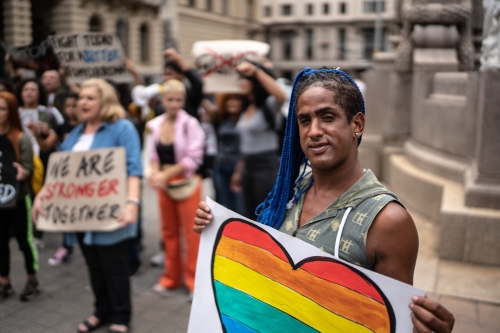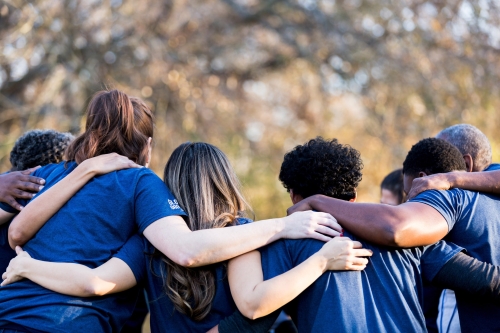
Our Research
The Center for LGBTQ Health Equity is leading scientific inquiry into several core areas including suicide prevention and LGBTQ+ research.

LGBTQ+
Past Work Archive
ASETS: A Longitudinal Investigation of Minority Stress in a Diverse National Sample of Sexual Minority Adolescents (1R01MD012252)
The goal of this 5-year grant from the National Institute on Minority Health and Health Disparities (NIMHD) is to determine how different trajectories of minority stress experienced throughout adolescence may predict behavioral health outcomes for sexual minority adolescents (SMA). In collaboration with our team at Childrens Hospital Los Angeles (CHLA), we will follow 1,500 adolescent (age 14-17) participants for four years, incorporating the fundamental tenets of developmental psychopathology and minority stress theory. The study will be one of the first to determine in a national sample how minority stress may influence health across the course of adolescence and into young adulthood.
Leadership Education in Adolescent Health (HRSA; 1T71MC30799)
The Leadership Education in Adolescent Health Program (LEAH) at Children’s Hospital Los Angeles (CHLA) was one of seven interdisciplinary training programs funded by the Maternal Child Health Bureau (MCHB) in the U.S. Department of Health and Human Services. The CHLA LEAH program was dedicated to training future leaders in adolescent health with the goal of reducing health disparities, as well as improving health equity and services delivery for adolescents. CHLA LEAH fellows participated in mentored, hands-on, and educational trainings in adolescent health, focusing on interdisciplinary practice, leadership skills, research, public health, advocacy, and policy. Training focused on five key adolescent health disciplines: medicine, nursing, nutrition, psychology and social work.
Military Acceptance Project (DOD; W81 XWH 15-1-0699)
First-ever Department of Defense-supported examination of active duty LGBT service members’ behavioral health needs. Research included qualitative interviews and quantitative surveys with LGBT service members from each of four military branches (Army, Navy, Air Force and Marines), and included recommendations to the Department of Defense regarding improving the health and well-being of LGBT service members.
- Phase I: A diverse sample of active duty service members across branches of the military recruited for life history calendar interviews on experiences with military related minority stressors. Service members spanned the spectrum of LGTBQ+ identities serving across the globe. Transcripts were analyzed for major themes across study participants.
- Phase II: A diverse sample of 480 (LGBT n=240, cisgender heterosexual n=240) active duty service members across four military branches will be recruited through respondent driven sampling (RDS). Service members will participate in an online quantitative survey created from the interviews in Phase I. Individual in-depth surveys, questionnaires, and egocentric social network structures were elicited and combined across reports to generate a sociometric network map within each service branch.
Measuring Minority Stress among Diverse Adolescents (NICHD; 1R21HD082813)
The purpose of this project was to develop a valid measure of minority stress, called the sexual minority adolescent stress inventory (SMASI) that is appropriate for use with LGBT adolescents of diverse racial and ethnic backgrounds.
Understanding suicidality among LGBT youth (The Trevor Project)
The purpose of this project was to test a mediated model that will explore pathways to suicide risk among LGBT adolescents and to evaluate the crisis services of The Trevor Project.
Substance Use and Technology: Testing an Innovative Method for YMSM Recruitment (NIDA)
National Institute on Drug Abuse funded study which examined the feasibility of using geosocial networking applications (e.g., Grindr, Tinder, Hornet) to recruit probability samples of 18-24 year old sexual minority men. The study involved the recruitment of half the sample using venue-based stratified probability sampling and half the sample using geosocial networking application probability sampling. Ultimately the study compared sample characteristics (i.e., demographics, mental health, and substance use) and recruitment methodology cost and recruitment efficiency, in order to make suggestions for future research with this population.
The Impact of Early Medical Treatment in Transgender Youth
One of seven interdisciplinary training programs funded by the Maternal Child Health Bureau (MCHB) in the U.S. Department of Health and Human Services. The program was dedicated to training future leaders in adolescent health with the goal of reducing health disparities, as well as improving health equity and services delivery for adolescents. Fellows participated in mentored, hands-on, and educational trainings in adolescent health, focusing on interdisciplinary practice, leadership skills, research, public health, advocacy, and policy. Training focuses on five key adolescent health disciplines: medicine, nursing, nutrition, psychology and social work.
The first U.S.-based, national multi-site observational study examining the physiological and psychological outcomes of existing medical treatment protocols for gender dysphoria, including puberty blockers and cross-sex hormones in early and late pubertal transgender and gender non-conforming youth.
Proud and Empowered! for Prevention (NIMHD; 1R21MD013971)
An LGBT-affirming intervention developed for LGBT adolescents experiencing disparities in behavioral health outcomes, seeking to address problems such as depression, anxiety and trauma symptomatology by focusing on the underlying mechanisms of change, minority stress. We are currently testing this intervention through a randomized clinical trial at four schools.
Proud and Empowered! for Treatment (W.T. Grant Foundation)
An LGBT-affirming treatment being developed for LGBT youth and emerging adults who are impacted by their substance use. We are working to modify and enhance the basis of Proud and Empowered! for Prevention to address the needs and outcomes of this population.
Train Your Brain (DOD; W81-16-C-0199)
Department of Defense-sponsored study assesses the efficacy of neurofeedback training for symptomatic reduction in veterans with PTSD. In collaboration with Tel Aviv University, we have developed a virtual reality-setting coupled with an EEG to record participant brain waves during neurofeedback sessions. During training, participants learn internal strategies for downregulating their amygdala, a region of the brain shown to be highly correlated with PTSD symptoms and PTSD onset following traumatic experiences.
*The Impact of Early Medical Treatment in Transgender Youth
The first U.S.-based, national multi-site observational study examining the physiological and psychological outcomes of existing medical treatment protocols for gender dysphoria, including puberty blockers and
